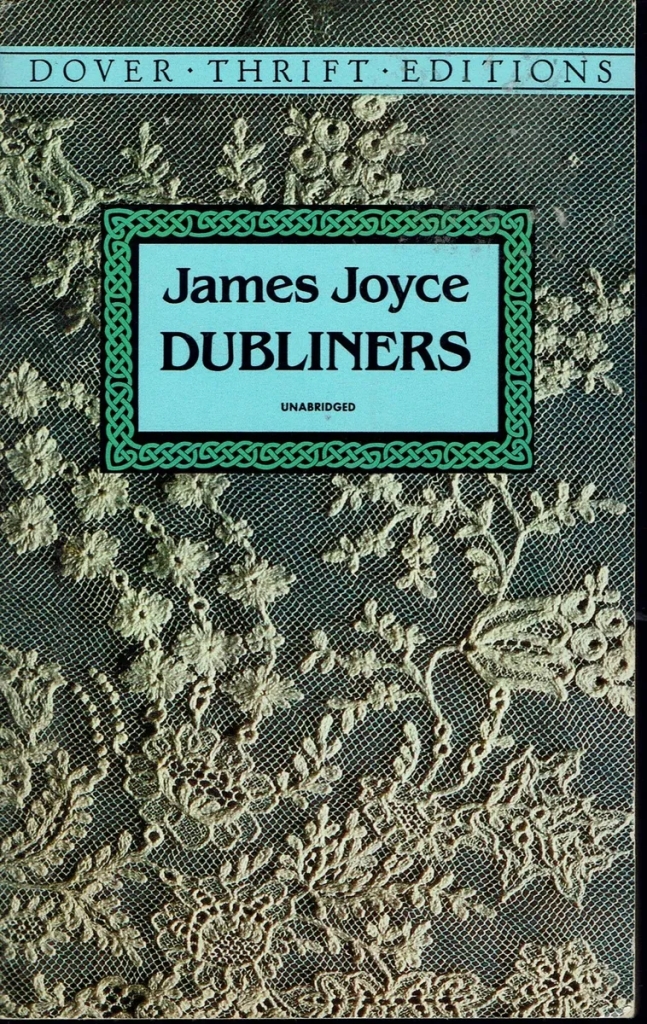
Dubliners by James Joyce is a collection of short stories set in Dublin, Ireland, telling a grander story of how he viewed Ireland before they gained independence through the lives of the children and adults living in Dublin. The people are stuck in a moral paralysis. Others similarly desire to escape the routines of everyday life and crave adventure, whether through fantastical stories, play, or wild parties.
The Sisters
- “But then I remembered that it [the heavy grey face of the paralytic] had died of paralysis and I felt that I too was smiling feebly as if to absolve the simoniac of his sin” (p. 2).
- “The duties of the priest towards the Eucharist and towards the secrecy of the confessional seemed so grave to me that I wondered how anybody had ever found in himself the courage to undertake them” (p. 4).
- Whereas the character in this story struggles with a moral paralysis of his own, the priest differs from him in that he doesn’t seem to be experiencing a paralysis of any kind. Instead, he does his duty despite the fear of it, which I as a pastor who handles the Lord’s very body and blood in the Eucharist can certainly attest to. I experience a fear of God every time I handle the elements, but amidst that fear I do my duty as God’s called and ordained servant to do so.
An Encounter
- “The adventures related in the literature of the Wild West were remote from my nature but, at least, they opened doors of escape” (p. 8).
- “But when the restraining influence of the school was at a distance I began to hunger again for wild sensations, for the escape which those chronicles of disorder alone seemed to offer me. The mimic warfare of the evening became at last as wearisome to me as the routine of school in the morning because I wanted real adventures to happen to myself. But real adventures, I reflected, do not happen to people who remain at home: they must be sought abroad” (p. 9).
- I could not help but think of Bilbo Baggins in The Hobbit as I read this.
Araby
- “I did not know whether I would ever speak to her or not or, if I spoke to her, how I could tell her of my confused adoration. But my body was like a harp and her words and gestures were like fingers running up the wires” (p. 16).
- This character is faced with a moral paralysis: whether or not to approach a beautiful woman and strike up a conversation. This quote resonated with me because I also struggled with initiating conversations with attractive women throughout my life. In fact, it was my wife who asked me out first! What I especially like about this quote is how he illustrates the awkwardness of trying to gather up the courage to say hello.
After the Race
- “Rapid motion through space elates one; so does notoriety; so does the possession of money” (p. 25).
The Boarding House
- “His instinct urged him to remain free, not to marry. Once you are married you are done for, it said” (p. 41).
- Marriage (and therefore parenthood) is a direct threat to the narcissistic individual, for it robs you of freedom. Marriage is dying to your self-centered desires because you become a servant—a servant to your spouse and your children. Marriage is not for weak-willed individuals who are so myopic that they cannot see beyond their immediate needs and wishes. This does not mean one’s needs suddenly become unimportant, but in marriage you are no longer living just for yourself but for the other(s) now.
The Dead
- “…our country [Ireland] has no tradition which does it so much honour and which it should guard so jealously as that of its hospitality” (p. 138).
- “A new generation is growing up in our midst, a generation actuated by new ideas and new principles. It is serious and enthusiastic for these new ideas and its enthusiasm, even when it is misdirected, is, I believe, in the main sincere. But we are living in a sceptical and, if I may use the phrase, a thought-tormented age: and sometimes I fear that this new generation, educated or hypereducated as it is, will lack those qualities of humanity, of hospitality, of kindly humour which belonged to an older day” (p. 138).
- I believe this is the hub of the entire novella. If you’re from Ireland, what do you think? Was James Joyce correct?
- “One by one, they were all becoming shades. Better pass boldly into that other world, in the full glory of some passion, than fade and wither dismally with age” (p. 152).
- As the book closes, these words seem to be words of encouragement to the characters struggling with a moral paralysis.
